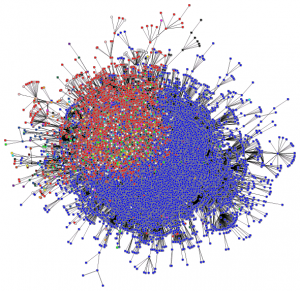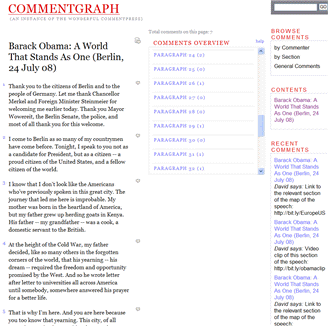Help us map the mind of the blogosphere
Cross-posted from: Independent Minds
To celebrate the launch of The Independent Minds blogs, and as part of our Obama project with The Independent newspaper, we are launching a global experiment to map the mind of the blogosphere.

Source: Matthew Hurst’s Blogosphere Meta-Core.
Not all of it, obviously… not, for example, the part that’s thinking about Britney Spears and Angelina Jolie.
We’re just focusing on the part thinking about the inauguration of the new President and the choices he faces. And we want to transfer the collective insight of the blogsophere into the map that’s already building here.
Can we do it? With your help… yes we can.

We’re not expecting you to learn the pros and cons of argument visualization; though if you want to stretch your mind with something other than a Crossword or Linkudo we’d love to help.
Instead, all you have to do, if you are blogger, is to let us know when you have posted about Obama and any of the policy issues he faces. You can do this in two ways:
(1) Include a link to the map in your blog post:
http://www.independent.co.uk/news/world/americas/article1022466.ece
or,
(2) Embed the map like a YouTube video, using the code below:
<iframe src=’http://debategraph.org/flash/fv.aspx?r=7714&d=2&i=1′ frameborder=’0′ width=’490′ height=’650′ scrolling=’no’></iframe>
Then tag the post TheIndyDebate. When you do this, we’ll detect the post and start to include your thoughts in the map.
Embedding the map will let your readers watch the map evolve in situ on your blog. And, if you link to or embed the map, we’ll publish a reciprocal link (both here and on the Independent Minds blog) back to your blog.
Starting now with: Ideal Government, Contrary Brin, AlwaystheTwain.
If we miss a blog post, email me at david AT debategraph DOT org – and if you’re not a blogger, but know someone who might interested in participating, please pass the links along.
Mapping Obama’s Speech in Berlin
As announced on the Global Sensemaking blog, and building on Tim Bonnemann’s excellent Wordle and Mark Szpakowski’s suggestion, I produced a draft map of Barack Obama’s speech in Berlin yesterday, which you can view and explore here.
The snapshot below displays the top layer of the map, and you are welcome to log-in and improve both the top layer and the underlying structure of the first draft.
As noted in the earlier post, the preparation of the first draft of the map emphasised the different senses, dimensions and saliencies of the speech that emerge via the different forms and interpretations: video, transcript, Wordle, and map. And, no doubt, others experiencing Obama’s speech first via TV news analysis, newspaper reports, David Frum, a photograph, or at the speech itself would take away different senses too.
To illustrate how it is possible to develop this kind of mapping analysis further live on the web already, I have started to weave together the map and the transcript of the speech using the Future of the Book’s marvellous CommentPress tool to enable directly addressable, granular access to the text of Barack Obama’s speech, linked to the relevant sections of the map (and vice versa)—with a video clip layered into the latter example for good measure as well.

The granular addressability is shown at the paragraph level in this example; however, CommentPress—which is being applied imaginatively to several public consultations in the UK—allows the user to define a deeper level of granularity, enabling a finer one-to-one correspondence between the source document and the map.
The hope embodied in this experiment is that in the build up to the Presidential election in November it might be possible exemplify the potential of the emerging web technologies to shift the modus of political debate (a degree or two) away from the calculated cacophony of ephemeral soundbites toward a more considered, constructive and cumulative conversation.
If you are willing to help in the pursuit of this goal—working on the transcripts, mapping and tying together the arguments, highlighting inconsistencies and areas of agreement, and holding the candidates transparently accountable to their words—please join us.

